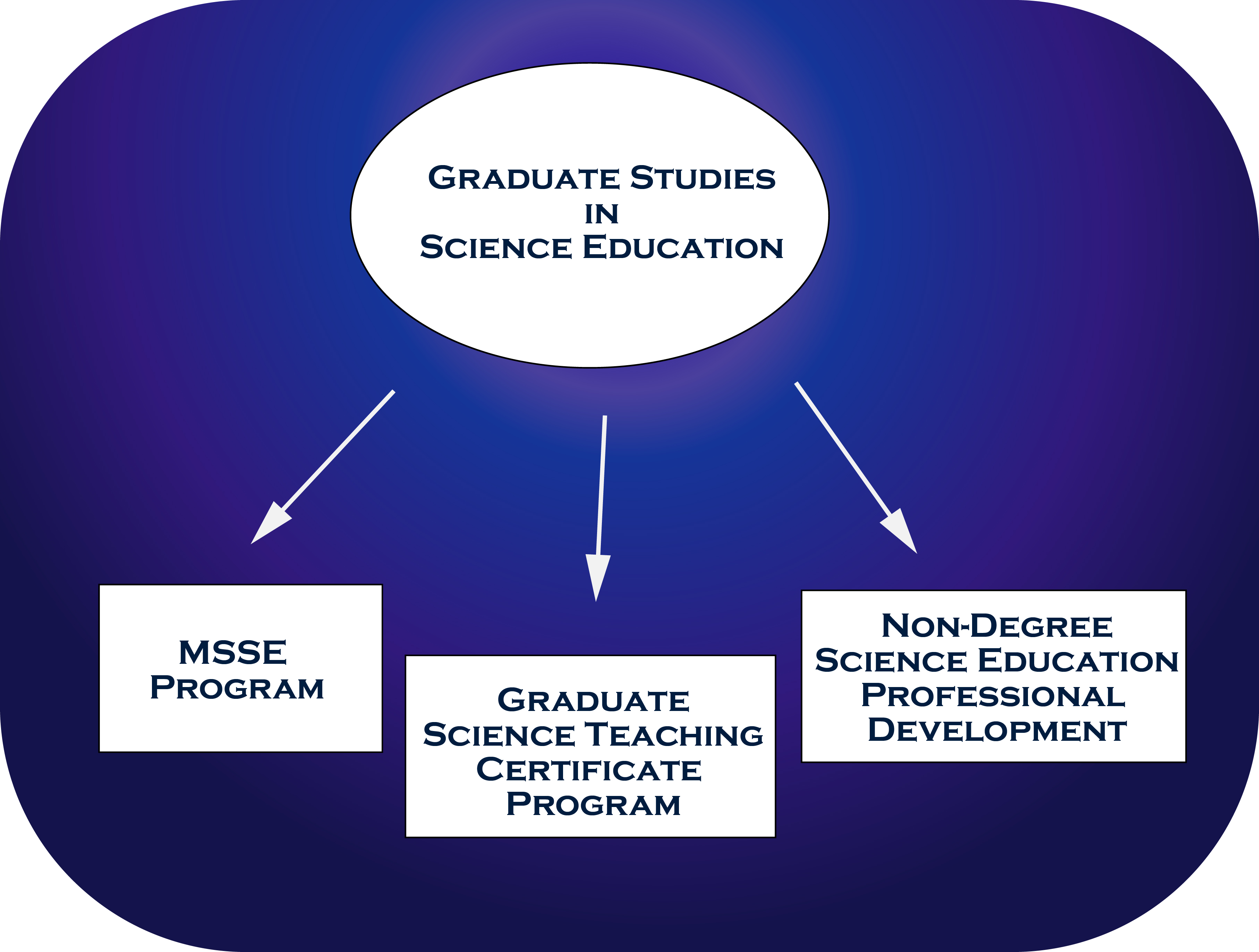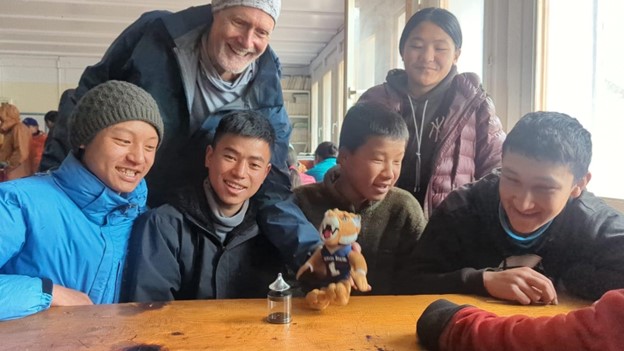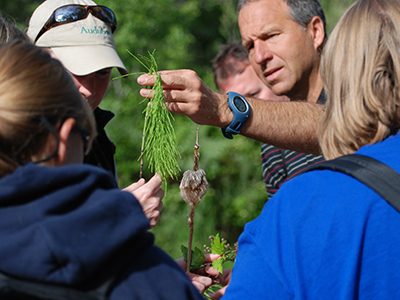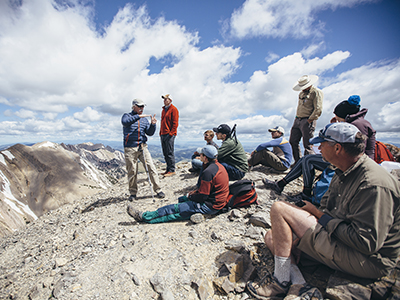About us
We offer graduate studies in science education in three areas: the Master of Science in Science Education (MSSE) Program, the Graduate Certificates in Science Education, and Non-Degree Science Education .

Our curriculum features unique online and campus-based graduate courses designed specifically for science educators with a dual focus on content and pedagogy. Courses in our program can be used toward the 30 credit master's degree (MSSE), the 12 credit Science Teaching Graduate Certificates, or as a non-degree student for professional development credit.
Graduate-level courses taken through the graduate certificate programs will also apply to the Master of Science in Science Education (MSSE) program to earn a degree. Credits can be applied after successful completion of the certificate program, or you may apply to both programs and complete them concurrently.
MSSE History
In May of 1996, the Montana Board of Regents of Higher Education approved a new degree, the Master of Science in Science Education (MSSE), designed for science educators interested in graduate study while remaining employed. MSSE is unusual in two important ways. First, it is an intercollege, interdisciplinary effort. Five colleges, The Graduate School, and sixteen departments collaborate to offer this innovative degree. Second, ninety percent of the course credits needed to complete the degree are offered by distance learning in structured interactive courses using asynchronous, computer mediated instruction.
While direct oversight of the program was provided by the Graduate School from inception to 2016, the program was moved to the College of Letters and Science July 1, 2016. In addition to completing core courses in education, those seeking the degree develop interdisciplinary combinations of science courses from offerings in biology, chemistry, Earth science, ecology, engineering, microbiology, physics, plant science, and other science content areas. All graduates complete a capstone project before graduation. The program celebrated the 25th Anniversary in July 2023. To date, approximately 1,200 teachers from the United States and abroad, have earned an MSSE degree.
MSSE Mission
The mission of the Master of Science in Science Education (MSSE) program is to provide an exemplary, accessible, responsive, and student-centered science and applied science education master’s degree resulting in enhanced teaching and learning of science for educators and their students.
MSSE Vision
MSSE promotes effective and innovative science teaching to a diverse community of science educators through the delivery of unique online and on-campus graduate courses designed specifically for science educators with a dual focus on content and pedagogy.
MSSE Values
Excellence – Strive to be an exceptional, adaptive, dynamic, and rigorous program that results in high rates of successful completion and student satisfaction by utilizing best practices in teaching, learning, business, and customer service.
Service – Provide exemplary service that is professional, seamless, efficient, responsive, and prompt, that advocates for students, and that leads to open communication among students, staff, faculty, and administration.
Opportunity – Improve opportunities and access to education through innovative modes of program and course delivery as well as flexible options for research focus.
Diversity – Embrace diversity at all levels: student backgrounds and experiences, students’ settings and teaching assignments, faculty backgrounds, interdisciplinary curriculum options, individualized programs of study, and capstone research opportunities.
Learning – Encourage, promote, and model life-long learning through comprehensive action research, field and laboratory experiences, exposure to cutting edge research and researchers, and innovative instructional strategies.
Empowerment – Work to empower students, graduates, faculty, colleagues, and staff by providing, and promoting participation in, professional development and leadership opportunities such as presentations and/or representation at state and national conferences, assisting program faculty with research and instruction, mentoring/coaching new students and/or faculty, and serving on STEM related committees and boards at all levels.
Community – Promote the development of a community of life-long learners by creating opportunities for networking through campus-based field/laboratory courses and the annual symposium; by connecting alumni and providing for post-graduation involvement; by maintaining the program’s interdisciplinary focus; by continued communication with program stakeholders; and by celebrating the success of students, graduates, staff, and faculty.
Access and Success
Motivated by Montana State University students’ calls for a curriculum in which each and every student can see themselves reflected, MSSE supports College, University, and disciplinary initiatives to guide the creation of a diverse, equitable, and inclusive environment in which all members of our community can work and learn.

Science education welcomes different perspectives and ways of approaching problems. We believe that a wider range of societal needs are met through the innovations of a diverse community of science instructors. We also strive to identify biases present in the best-practices models and strategies we teach and develop so that they do not propagate inequity. This is an ongoing discussion that we are committed to in the Master of Science in Science Education program.
Faculty & Staff Resources
Graduate Certificates in Science Education History
In the early 1990's, the National Teacher Enhancement Network (NTEN) was established offering on-line science courses to teachers nationwide. In addition to increasing awareness, acceptance, and expertise among faculty and administrators, such experience with distance delivery has resulted in the development of an infrastructure for both faculty and student support that enables MSU to provide high quality learning experiences at a distance.
The NTEN Program originally created science teaching certificates. By 2020, NTEN merged with MSSE, providing a wide selection of online science content courses and certificate programs in the areas of chemistry, climate science, Earth science, elementary school science, life science, and physics and STEM.
MSSE Values Non-degree Professional Development in Science Education
As an alternative to completing the MSSE or graduate certificate programs, educators may take graudate level science education courses as a non-degree student. This option allows them to enroll in our elective courses, both online or on-campus, without admission to the MSSE or Graduate Certificate program. If non-degree students later decide to complete one of these two programs, up to 3 credits of non-degree coursework can be applied toward a certificate and up to 9 credits can be applied towards a MSSE degree.
Our Instructors
Our graduate courses were developed by Montana State University faculty members and others who are active in science, science research, science education, and mathematics. The programs we offer are a unique, cooperative effort of several colleges and includes courses taught by faculty in the following departments:
- Biology
- Cell Biology and Neuroscience
- Chemistry and Biochemistry
- Computer Science
- Earth Science
- Education
- Electrical Engineering
- Land Resources and Environmental Science
- Mathematics
- Microbiology
- Nutrition
- Physics
- Plant Sciences
Instructors have doctorate or masters degrees in the subjects they teach.



